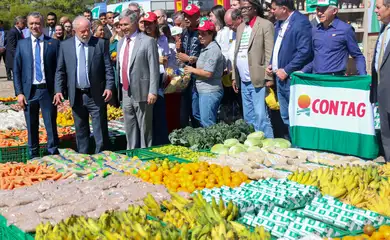Brazil: family farming is 8th largest food producer in the world

If all family farmers in Brazil formed a country, it would be the eighth largest food producer in the world. The data are part of the Statistical Yearbook of Family Farming 2023, released by the National Confederation of Rural Workers and Family Farmers (Contag).

The document aims to show the participation of family farming in total Brazilian agricultural production. The figures are based on research carried out by the government´s statistic agency IBGE.
The release of the yearbook takes place in the week that celebrates the International Day of Family Farming, July 25, a date created by the Food and Agriculture Organization of the United Nations (FAO).
Contag´s yearbook points out that Brazilian family farming plays a pivotal role in supplying the domestic market with healthy products and sustainable management of environmental resources.
Boasting 3.9 million agricultural establishments, family farms represent 77 percent of all such establishments and occupy 23 percent of Brazil´s total agricultural land—80.8 million hectares.
Family farming contributes 23 percent to the gross value of agricultural production and accounts for 67 percent of rural occupations. Approximately 10.1 million workers engage in this activity, with the Northeast region hosting 46.6 percent of them, followed by the Southeast (16.5%), South (16%), North (15.4%), and Midwest (5.5%).
In family farming, both food production and property management are predominantly the responsibility of the family.
The president of Contag, Aristides Santos, argues that knowing the numbers of family farming is a way to develop the activity. "In addition to knowing and showing the strategic importance of the segment to society as a whole, gathering this data in a yearbook also aims to contribute to the debate on the role of family farming for the development of the country, and the valorization and recognition of the individuals that compose it and its representative entities," he said.
Economy engine
Beyond food production, family farms fuel local economies, acting as economic engines. In municipalities with up to 20,000 inhabitants, representing 68 percent of the country´s total, family farming contributes 40 percent to the income of the economically active population. This generates a multiplier effect, fostering employment and boosting income in rural communities.
Incentive
On June 28, the government launched the 2023/2024 Family Farming Harvest Plan, with BRL 71.6 billion earmarked for rural credit under the National Program for Strengthening Family Farming (Pronaf). The amount is 34 percent higher than that announced in the last harvest and the largest since its beginning.



